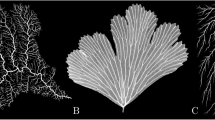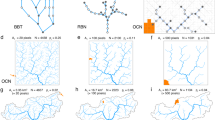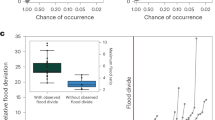Abstract
IN my contribution to the discussion at a symposium1 in 1957 on the theory of dams, I suggested that the distribution of the time to emptiness of a finite dam or reservoir might be investigated by the use of Wald's identity. This method has recently been used by R. M. Phatarfod2 in the case of inputs with negative exponential distribution. It seems worth noting how the asymptotic case of normal diffusion, which should be useful as an approximation in all cases where individual (independent) increments are fairly small in relation to the capacity of the dam, may be dealt with. This asymptotic theory has, moreover, an immediate extension to the case of correlated increments by our determining the effective diffusion per unit time in such a case (compare with my concluding remarks, loc. cit.).
This is a preview of subscription content, access via your institution
Access options
Subscribe to this journal
Receive 51 print issues and online access
$199.00 per year
only $3.90 per issue
Buy this article
- Purchase on Springer Link
- Instant access to full article PDF
Prices may be subject to local taxes which are calculated during checkout
Similar content being viewed by others
References
Bartlett, M. S., J. Roy. Statist. Soc., B, 19, 81 (1957).
Phatarfod, R. M., Ann. Math. Statist., 34, 1588 (1963).
Weesakul, B., Ann. Math. Statist., 32, 765 (1961).
Author information
Authors and Affiliations
Rights and permissions
About this article
Cite this article
BARTLETT, M. An Asymptotic Theory for Dams. Nature 202, 731–732 (1964). https://doi.org/10.1038/202731c0
Issue Date:
DOI: https://doi.org/10.1038/202731c0
Comments
By submitting a comment you agree to abide by our Terms and Community Guidelines. If you find something abusive or that does not comply with our terms or guidelines please flag it as inappropriate.



